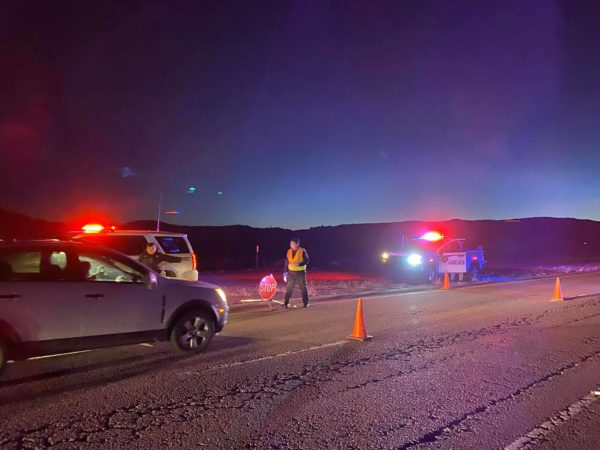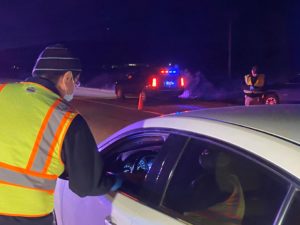
- Details
- By Native News Online Staff
WINDOW ROCK, Ariz. — The Navajo Nation stepped up its efforts to contain the spread of the COVID-19 (novel coronavirus), setting up roadblocks Monday night as a curfew took effect to keep Navajo citizens at home.
Soon after the curfew went into effect at 8:00 p.m., the Navajo Police Department set up roadblocks to check if the drivers of vehicles were going to or coming from their place of employment.
Joining some officers at some of the roadblocks were Navajo Nation Jonathan Nez, Vice President Myron Lizer and Police Chief Phillip B. Francisco. The Navajo Nation leaders handed out COVID-19 pamphlets and urged drivers to return home safely and comply with the curfew.
The curfew allows for Navajo tribal citizens to travel to and from work during the overnight curfew hours (8:00 p.m. to 5 a.m.). The curfew will remain in effect nightly until further notice.
 Navajo Nation President Jonathan Nez on the frontline at a roadblock to enforce curfew on Navajo Reservation.
Navajo Nation President Jonathan Nez on the frontline at a roadblock to enforce curfew on Navajo Reservation.
On Monday evening, Navajo Police were checking for proof of essential work status for drivers and occupants. Drivers must have on their possession official identification and/or a letter of designation from their essential business employer on official letterhead which includes a contact for verification.
As the night progressed, President Nez received reports of very low traffic flow in several communities on the Navajo Nation.
Nez urged Navajo citizens to remind family and friends of the curfew and stay home as much as possible.
 Roadblocks on the Navajo Nation to let tribal citizens the curfew will be enforced.
Roadblocks on the Navajo Nation to let tribal citizens the curfew will be enforced.
“Stay home, stay safe! We are doing our best to keep people safe, but the government can’t do everything and that’s why everyone needs to stay home as much as possible. Every person is responsible for taking precautions to preserve their own health. This curfew is an added measure to protect our Navajo people, especially our elderly and high-risk. Everyone should read the new order entirely,” President Nez said on Sunday when he announced the curfew.
More Stories Like This
Native News Weekly (August 25, 2024): D.C. BriefsUS Presidents in Their Own Words Concerning American Indians
Two Murdered on Colville Indian Reservation
NDAA passes House; Lumbee Fairness Act Advances
NFL, Vikings to Host Native All-American Game, Youth Flag Clinic
Help us defend tribal sovereignty.
At Native News Online, our mission is rooted in telling the stories that strengthen sovereignty and uplift Indigenous voices — not just at year’s end, but every single day.
Because of your generosity last year, we were able to keep our reporters on the ground in tribal communities, at national gatherings and in the halls of Congress — covering the issues that matter most to Indian Country: sovereignty, culture, education, health and economic opportunity.
That support sustained us through a tough year in 2025. Now, as we look to the year ahead, we need your help right now to ensure warrior journalism remains strong — reporting that defends tribal sovereignty, amplifies Native truth, and holds power accountable.
 The stakes couldn't be higher. Your support keeps Native voices heard, Native stories told and Native sovereignty defended.
The stakes couldn't be higher. Your support keeps Native voices heard, Native stories told and Native sovereignty defended.
Stand with Warrior Journalism today.
Levi Rickert (Potawatomi), Editor & Publisher

